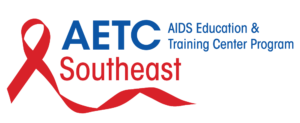Interprofessional Education (IPE)
Building the HIV Workforce
The IPE program educates health professionals and trainees to address the health care needs of People with HIV (PWH) through interprofessional education and collaborative practice. The goals of the Southeast AETC IPE Program are to cultivate respectful professionals, prepare a collaborative practice–ready work force, improve health care delivery and systems and create self-directed lifelong learners.
Interprofessional Education Collaborative Core Competencies
Source: Interprofessional Education Collaborative
The core competencies and sub-competencies feature the following desired principles: patient and family centered; community and population oriented; relationship focused; process oriented; linked to learning activities, educational strategies, and behavioral assessments that are developmentally appropriate for the learner; able to be integrated across the learning continuum; sensitive to the systems context and applicable across practice settings; applicable across professions; stated in language common and meaningful across the professions; and outcome driven.
Values/Ethics for Interprofessional Practice
Work with individuals of other professions to maintain a climate of mutual respect and shared values.
Roles/Responsibility
Use the knowledge of one’s own role and those of other professions to appropriately assess and address the health care needs of patients and to promote and advance the health of populations.
Interprofessional Communication
Communicate with patients, families, communities, and professionals in health and other fields in a responsive and responsible manner that supports a team approach to the promotion and maintenance of health and the prevention and treatment of disease.
Teams/Teamwork
Apply relationship-building values and the principles of team dynamics to perform effectively in different team roles to plan, deliver, and evaluate patient/population-centered care and population health programs and policies that are safe, timely, efficient, effective, and equitable.
Anna Person, MD
Southeast AETC IPE Lead
Taryn Buckley, PhD, CHES
Program Manager, North Florida AETC
[email protected]
Adrena Harrison, RN, MSN, ACRN
Director of Education, South Carolina AETC
[email protected]
Evelyn Villacorta
IPE Program Director, Kentucky AETC
[email protected]
AETC Program Interprofessional Education (IPE) Toolkit
This toolkit is comprised of resources and tools created and/or modified by the AETC Program for these IPE projects. They are available for use as examples for other institutions and organizations developing IPE programs.
Medical Student
100,000% IPE influenced me. I learned that I like managing complex patients, both medically and socially. Being at the VCCC has been so enjoyable and I am strongly considering ID as a specialty.
Nursing Student
Prior to starting IPE I did not have plans to work specifically with individuals living with HIV. IPE has opened my eyes to the opportunities available in working with this population and given me confidence in navigating the resources available to them. Now, I can see that working with this population encompasses all the demographics that I want to see in my future practice. Whenever I am asked, I tell people it would be an honor to continue working with this population.
Pharmacist Student
My baseline knowledge of HIV/AIDS was not much more than knowing what the acronyms stood for. After starting the program, I began to feel very attached to this patient population and was fascinated by not only HIV, but infectious diseases in general. It is such a unique population of people and it opened my eyes to caring for a person as a whole. There is so much misinformation and lack of knowledge/experience, even among educated professionals, that I definitely took ownership in being the person that others came to for questions or insight. I knew very early on that I wanted a career that somehow involved working with people living with HIV. Unfortunately, there are few career opportunities for pharmacists that are as niche as working with people living with HIV. However, after graduation I began working as a clinical staff pharmacist at the hospital in my hometown of Glasgow, KY where I became the unofficial “infectious disease pharmacist” (we are too small to really have specialties). I have been able to educate many of my colleagues about the nuances of this population and disease state. I think I will always feel a connection to this population of people.
Social Work Student
This was a wonderful experience. IPE helped me to gain insight into a population that I had never thought of working with. I had little to no knowledge of HIV/AIDs but love to learn. The staff at the SE AETC was a wealth of knowledge and were so patient to explain things in a way that did not overwhelm me. My favorite part of the experience was being able to shadow a client from the beginning of an appointment in the waiting room to check out. It was really amazing to see everything that client’s go through during one visit with their doctor from labs to case management. IPE gave me the confidence to apply to my now job at Careteam+ in Conway, SC as a medical case manager. Without that prior experience, I would not have considered myself qualified for the job. Flash forward and I now have 80 clients that are HIV positive that I have the privilege of working with as their case manager. I am beyond grateful for the IPE experience and the opportunities it has afforded me.
